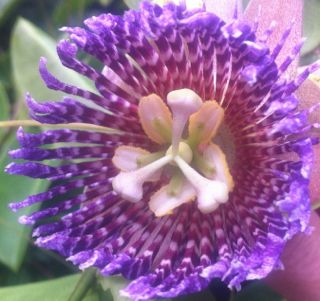_______________________________________________________________________________________________________________________
Passionflower
Passionflower is one of the most beautiful of plants!
Its stunning flowers delight the eyes and are so intricate with their delicate thread-like filaments that they remind me of how the nervous system looks in the body. The soft purple colour is indicative of its use in supporting the wellbeing of the mind and is helpful for sleeplessness, insomnia and many more conditions.
Passionflower is a vine that twists and turns as it reaches for the sky, and traditionally, vine plants have been viewed as having properties for helping the nervous system. Delicate looking and soft, it seems like the very conditions in humans it treats! So what does that mean?
When herbalists talk about matching an herb to a person, they refer to the personality picture of the condition the client is experiencing. For example, passionflower is strongly indicated for an individual who is stressed out, worried, overworked, mentally exhausted, and may be experiencing shortness of breath, palpitations, restlessness or sleeplessness.
Passionflower influences the nervous system, specifically a part of the brainstem that oversees sleep, temporary fluctuations in blood pressure, digestion, respiratory and more. Therefore, herbalists will utilize passionflower for symptoms and conditions where the brain and nervous system's irritation are present.
In my herbal cases, a few people with a generalized anxiety disorder were able to stop their lorazepam drug for anxiety. Accompanied with support from other therapists, lifestyle changes and passionflower, these individuals have continued to manage without the need for anti-anxiety medications.
Please note: do not take yourself off any medications you have been prescribed without checking with your doctor. You may need medical and pharmaceutical support to change medications or dosages.
Passionflower works as a nerve calmative and is useful when experiencing sleeplessness by creating a quieting effect and a restful state which allows for rest. Now, suppose you are generally in robust health and are experiencing insomnia. In that case, passionflower may not be your best choice as you do not fit the profile of the exhausted, weakened or debilitated person. You may do better with Valerian root.
Other people who may benefit from the lovely passionflower are individuals who cannot turn off the internal dialogue, who are easily distracted, chatterboxes and perhaps even stoic people.
Passionflower has been studied for use for individuals with addictive drug habits who have difficulties sleeping and alleviating symptoms from opioid addiction and withdrawal.
Studies are being conducted for use for ADHD children, and passionflower is showing some promise.
Passionflower received its name from the 16th Century Christian Missionaries who came to South America and saw this flower as a symbol of the death of Christ and so named it passionflower. One of the signs they noticed was the lace-like little strands called filaments, which they decided looked like the crown of thorns Jesus was forced to wear on his head in their biblical stories. Just in case you did not know, the reference to the Passion of Christ means the suffering of Christ.
Passionflower is also has known as maypop, wild apricot, wild passion vine or simply apricot vine. This plant belongs to the family Passifloraceae.
It grows along the roadside, prairies, plains, meadows, stream and riverbanks, located from Pennsylvania to Missouri and further south from Texas to Florida and flourishing in South and Central Americas and Hawaii.
It is a climbing vine that can reach up to 30 feet in height. Its flowers are white to purple, and its fruit is egg-shaped and fleshy, green when unripe and turning yellowish as they ripen. The fruit has a yellow jelly-like pulp has a fresh, sweet yet slightly tart taste.
All parts of the plant are used; root, stem base, leaves and whole flowering tops. It can be administered as a tea, tincture, capsules, tablets, and extracts.
Passionflower's taste is a little sweet and has a slight taste of acrid (an indication of being a calming herb), and its energy is cool, not warm.
Passionflower is generally considered safe but is contraindicated with certain medications see above. If you are on medications it is always a good practice is to check with your medical doctor, pharmacist or health practitioner before adding this herb to your regimen.
(c) Wendolyn Murdoch
Disclaimer: The information, including but not limited to, text, graphics, images and other material contained on this website are for informational purposes only. It is not intended to be a substitute for professional medical advice, diagnosis or treatment. Always seek the advice of your physician or other qualified health care provider with any questions you may have regarding a medical condition or treatment and before undertaking a new health care regimen.
The owner of these written materials makes no claims as to the accuracy or completeness of any of the information, including any links. The owner will not be liable for any errors or omissions in this information.

